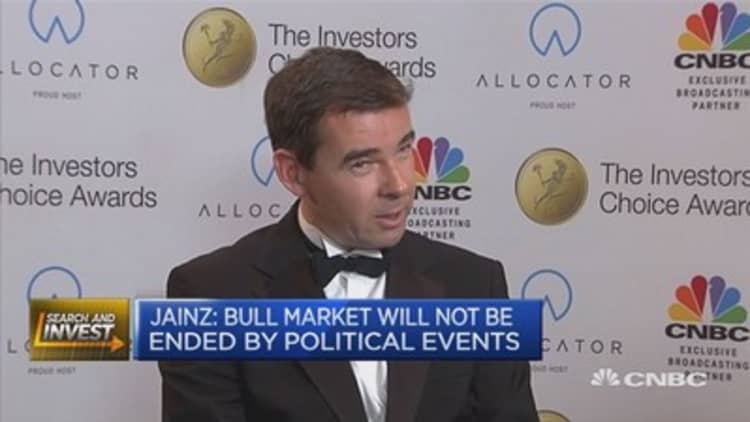
European equity funds have recorded their biggest weekly inflow in over 13 months as March draws to a close, while U.S. equity fund flows head in the opposite direction, according to data from EPFR Global.
Increasing momentum for pro-business candidate Emmanuel Macron in the upcoming French presidential election, at the expense of his populist rival Marine Le Pen, has helped ratchet down the fear factor over European politics. Similarly, the more conciliatory tone that accompanied the beginning of the Brexit process this week was instrumental in further dampening down political nerves. These events both follow the crushing defeat of populist candidate Geert Wilders in the Netherlands' prime ministerial elections earlier this month.
Taking the spotlight off of the political situation in Europe has prompted investors to pay closer attention to the economic situation on the continent which has recently shown some reasons for cautious optimism. Unemployment sits at a six-year low within the bloc and the most recent growth figures have kept pace with those out of the U.S.
Looking more closely at the euro zone's largest economy, Fathom Consulting argues that despite the 5.6 percent rise in the main German index, the DAX, seen so far in 2017, there is more to play for.
"We see further upside potential throughout the year," said a note from the economists to clients on March 31.
"We anticipate the German economy will expand by 1.8 percent this year, outperforming both the consensus and the euro area as a whole," the note added.
Meantime, U.S. equity funds recorded their second consecutive week of outflows in the last week of the month, with Bank of America analysts pointing to the botched attempt by U.S. President Donald Trump to repeal former President Barack Obama's health-care plan as the key driver of the unwind of some "aggressive fiscal stimulus trades" focused on infrastructure, materials and U.S. value stocks.
Indeed, the first "red flags" are being seen in developed Anglo-Saxon markets, Ralph Jainz who runs the Halkin Wittenberg European Small & Mid Cap Fund at Halkin Asset Management told CNBC at the Investors' Choice Awards on Thursday evening.
"We find less and less pockets of mispricing and undervaluation. Expectations are very high – probably by now unrealistically high. We are coming to the mature end of the cycle. We are seeing the first warning signs and red flags," he observed.
Jainz pointed to credit availability in the U.S., particularly highlighting flagging lending dynamics in commercial and industrial loans as well as auto and household debt. Given the U.S. economy is poised for a series of interest rate hikes, Jainz noted his concerns about the outlook for ongoing demand dynamics, particularly given the boost demand has received for many years on the back of cheap financing fuelled by generous central banks, which may have had the effect of artificially "bringing forward" demand rather than creating a wholly new source.
"If there is any demand destruction coming from that then we would probably look at the very tail end of the current economic bull market in equities and as far as we are concerned valuations are really already so stretched, already the risk is sincerely asymmetric – i.e. weighted to the downside – there may be another 5-10 percent on the upside if valuations overrun," he said.
While Jainz believes it is still too early to start shorting too aggressively given expectations for a buoyant first and second-quarter earnings' season, he believes over the course of this year, more returns are likely to owe to short positioning than long.
"We'll probably reach the point of not only maximum euphoria but also in terms of the estimates for revenue and earnings growth for the years to come," he opined, before outlining what could lie beyond the summer.
"As interest rates rise it is almost impossible to assume that there is no effect on demand and potentially demand destruction … [also if that] bringing forward effect ultimately leads to a sharper deterioration, the slowdown could actually be quite rapid," Jainz cautioned.



